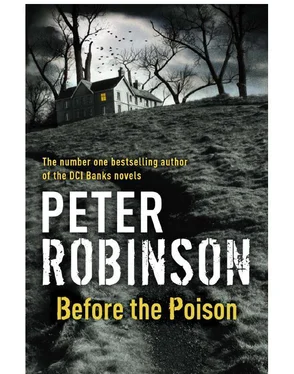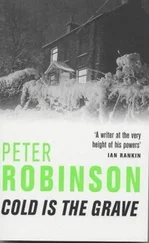Peter Robinson - Before the poison
Здесь есть возможность читать онлайн «Peter Robinson - Before the poison» весь текст электронной книги совершенно бесплатно (целиком полную версию без сокращений). В некоторых случаях можно слушать аудио, скачать через торрент в формате fb2 и присутствует краткое содержание. Жанр: Исторический детектив, на английском языке. Описание произведения, (предисловие) а так же отзывы посетителей доступны на портале библиотеки ЛибКат.
- Название:Before the poison
- Автор:
- Жанр:
- Год:неизвестен
- ISBN:нет данных
- Рейтинг книги:4 / 5. Голосов: 1
-
Избранное:Добавить в избранное
- Отзывы:
-
Ваша оценка:
- 80
- 1
- 2
- 3
- 4
- 5
Before the poison: краткое содержание, описание и аннотация
Предлагаем к чтению аннотацию, описание, краткое содержание или предисловие (зависит от того, что написал сам автор книги «Before the poison»). Если вы не нашли необходимую информацию о книге — напишите в комментариях, мы постараемся отыскать её.
Before the poison — читать онлайн бесплатно полную книгу (весь текст) целиком
Ниже представлен текст книги, разбитый по страницам. Система сохранения места последней прочитанной страницы, позволяет с удобством читать онлайн бесплатно книгу «Before the poison», без необходимости каждый раз заново искать на чём Вы остановились. Поставьте закладку, и сможете в любой момент перейти на страницу, на которой закончили чтение.
Интервал:
Закладка:
I laughed. ‘It’s a deal.’
As I opened the wine, I reflected how our discussion had made me think perhaps more of my own mystery than that of Grace Fox. Not mystery, so much as the twisted, half-hidden guilt I had confronted after my talk with Billy. I had thought about it more that night out on the balcony with my wine, and I had accepted what I’d done, made the first tentative move towards forgiving myself. In an odd way, getting to know Grace had helped me do that.
While I would cheerfully have given the moon, the planets and the stars not to have had to kill Laura, I knew that it had been the right thing to do. You can’t let someone you love suffer an agony that gets worse every day and has no possibility of ever abating or ending, except in an even more drawn-out and painful death.
Would I tell Heather what I had done? I didn’t know. Those questions were for later. For now, we would go on as we were, playful and easy. I would finish my piano sonata, and perhaps it would even be a success. At least it would be music people listened to. It would have Grace’s name in its title somewhere; I knew that much. Spring would come, the snowdrops, crocuses, daffodils. Then the woods would be full of bluebells; the birds would come back from the south and sing, the swallows would return. A turning point would come for Heather and me eventually, of course – they always do – and decisions would have to be made then. But not yet. Not yet.
Extract from the journal of Grace Elizabeth Fox (ed. Louise King), November, 1945. Netley, Hampshire
Saturday, 3rd November, 1945 This morning, just after our demob, Matron gathered us all together in one of the big cold lecture halls. I could hear the rain pattering against the large sash window beside me, occasionally getting louder, carried on a sudden gust which made the window rattle. Matron told us first that she had a number of things to say to those of us who were now leaving the service for civilian life. First, she wanted to thank us for all we had done, and she went on to extol the virtues of military nursing, and of the QAs in general. Then she said that we were now about to face probably one of the most difficult tasks and duties of our lives. After all the things we had witnessed, done and suffered, I must admit that we all looked rather askance to hear this. But Matron was a wise woman. We listened. She went on to say that the transition from war to civilian life is always a difficult one, but that it would be especially difficult for us because we were women. Not only that, but we had lived close to the battlefields, close to the fighting men themselves, not in hospitals miles away, where the guns could not even be heard. We had heard guns. Some of us had even felt their sting. We had been bombed, sniped at, shelled, shipwrecked, and worse. Many of us had also suffered great physical and mental privations in the camps or under life-threatening conditions in the wild. In order to survive, Matron told us, we had had to exist, and to act, in ways that were not always ladylike, and some of us may have been stigmatised by our experiences. Then Matron urged us to think of our families, present or future. Their world was not our world, she said, but it was a world we had fought for; there was not one point of contact between those at home and those who had done what we had done, but we had done it for them. There was nothing they could understand about what we had been through and how it had affected us. If she was about to tell us not to talk about our experiences, I thought, then she had no need to bother. I think most of us would rather not. But it was more than that. Whatever our war experiences, Matron concluded, it was now our God-given duty to be young ladies, housewives, sweethearts and mothers again, not unrecognisable figures slithering around in the mud and blood of a casualty clearing station, or lying in the filth and squalor of a Japanese POW camp. Our loved ones did not want to hear or know about these things. If they did, they would never look at us in the same way again; we would become pariahs. We had a role and a duty to perform in society, and in order to do so, we had to put the last five years behind us and mould ourselves into the image of the feminine again: the wife, the mother. That was what our world needed now, and that was our role in it. The men would get all the glory, as usual, Matron said, to knowing smiles all around, and this time we should let them have it. I glanced at Dorothy beside me, and she rolled her eyes. I smiled. It was all a bit too much, I supposed, but at bottom, Matron was right. Later, after the farewells and the promises to write, clutching my small suitcase in one hand and my travel pass in the other, I walked through the park in the rain towards the railway station. Raindrops dripped from the bare branches. What a very English November day it was, I thought, and I felt a great surge of love for my country, for the future. Perhaps Matron was right. We needed to lock the memories away and get on with our lives. We needed to rebuild, to look forward, not behind. The train stood waiting at the platform, puffing steam into the drizzle. I settled back in my seat to watch the landscape go by and opened my journal. In a few hours I will arrive at Darlington. Ernest will be waiting for me at the station. We will get into the car and drive back to Kilnsgate, to home. There, my future will begin.
Интервал:
Закладка:
Похожие книги на «Before the poison»
Представляем Вашему вниманию похожие книги на «Before the poison» списком для выбора. Мы отобрали схожую по названию и смыслу литературу в надежде предоставить читателям больше вариантов отыскать новые, интересные, ещё непрочитанные произведения.
Обсуждение, отзывы о книге «Before the poison» и просто собственные мнения читателей. Оставьте ваши комментарии, напишите, что Вы думаете о произведении, его смысле или главных героях. Укажите что конкретно понравилось, а что нет, и почему Вы так считаете.












